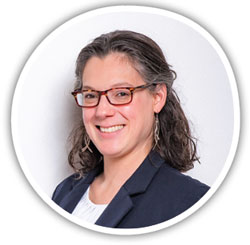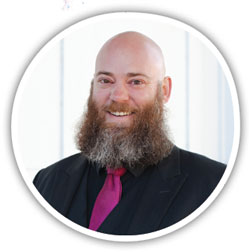
Jerri Adams Belcher
Jerri Adams Belcher is a partner at Wanta Thome. She represents individuals who have experienced discrimination, retaliation, and harassment in the workplace.
jcbelcher@wantathome.com
There is no time like the present, so I would choose to stay in 2023. However, if I could live anywhere for a year, I would live and work in the Bay area. On a personal note, the Bay area has sentimental meaning to my family. We have fond memories of hiking in the region and enjoying the culinary scene. It would be such a treat to have a daily view of the San Francisco Bay.
As a plaintiff’s side employment attorney, I’ve always viewed California as a leader in progressive workplace policies. Right now, everyone is waiting to see how disruptive artificial intelligence will be to the workforce. California has proposed several bills to regulate automated employment decisions tools and to minimize negative consequences in an employment context. While legislation is still being introduced, I would love to watch and learn from Californians the best practices in protecting workers’ rights as the use of artificial intelligence continues to expand in the workplace.

Jessica Intermill
Jessica Intermill represents tribal nations in matters of treaty rights, federal Indian law, and tribal law. As a land-history consultant, she helps individuals and organizations learn the history of the land they stand on and locate themselves in our shared story. jessica@intermillconsulting.com
My work has taught me that now is always. Other times and places exist all around us. We drive streets that were platted by surveyors in the 1840s and 1850s. Those surveyors followed on the heels of treaty negotiators who strong-armed land cessions throughout the 1800s for their own economic and political gain. The treaty negotiators relied on an 1823 opinion by Chief Justice John Marshall validating U.S. power to take land from indigenous occupants because the land was “empty.” That unanimous decision of the “courts of the conqueror” (C.J. Marshall’s words) relied on the Doctrine of Discovery. And that centuries-long legal tradition of European countries stood on Papal bulls of 1452, 1455, and 1493, claiming the globe and its people for Christianity and commerce.
The Church repudiated the Doctrine of Discovery in March of this year. It wrote that the doctrine “fail[ed] to recognize the inherent human rights of indigenous peoples” and it rejected the doctrine’s legitimization of “immoral acts[.]” But Johnson v. M’Intosh, 21 U.S. 543 (1823) is still good law; the Supreme Court expressly relied on it in 2005. Our homes, offices, and cabins are in Minnesota—not Mni Sota Makoce—because the Vatican of the 1500s, the fur trade of the 1600s and 1700s, and robber barons of the 1800s are all with us today.
And. Just as the decisions of centuries past influence our “now,” our decisions today shape the world to come. Tomorrow is also here today. Whether we intend to or not, we will time-travel with our decisions, just as our forebearers have. The only question is what kind of ancestors we decide to become.

Landon Ascheman
Landon Ascheman is a criminal law attorney who teaches at Mitchell Hamline and is an active member in many areas of the bar associations.
landon@aschemanlaw.com
It sounds interesting to go back in time and spend a year seeing the world from a new perspective. I’m going with the assumption that I can’t actually change the past. But I could go back in time and see how America truly was before anyone traveled from Europe, I could watch the pyramids being built, or spend time with the dinosaurs right before their extinction. Heck, I would be tempted to go all the way back in time and watch the universe being born, assuming I would be able to survive a year in the void. But I think surviving in the void, or with the dinosaurs, or even simply surviving before the modern age would be less than pleasant.
Thinking of traveling to the future, assuming you wouldn’t be able to change the future upon your return, I’m not sure that’s information I would want to have, especially if there was no chance to change anything. If the future isn’t static, I might go forward in time to a point where we solve some of our current world challenges, spend the year learning as many solutions as possible, and return to share that knowledge. However, then we fall into a bootstrap paradox like the one in Bill and Ted’s Excellent Adventure, when Bill and Ted learn Rufus’s name from future Bill and Ted.
Overall, I would prefer to spend that year right now, with my family and friends. We have a wonderful home, with so many fun activities, swimming, soccer, game nights. I enjoy my work, I have the time to give back, and I get to spend time with so many wonderful people.
I think I would spend my year right now, right here, doing what I love with those I care about. Okay, if I could take them with me, I would totally go on a world cruise for the year.